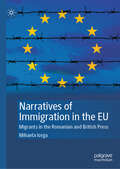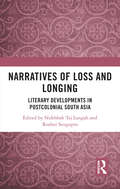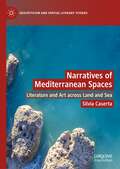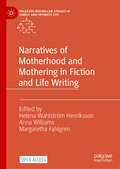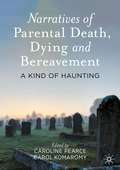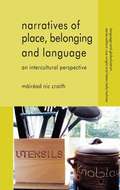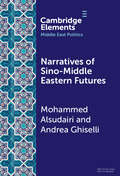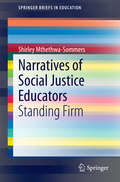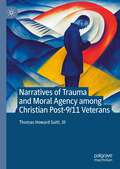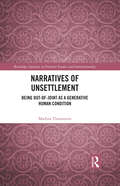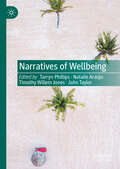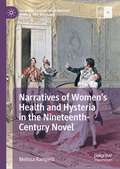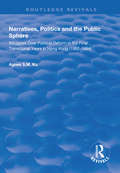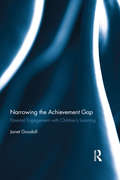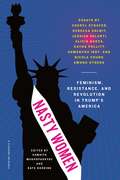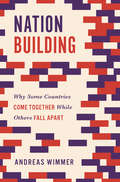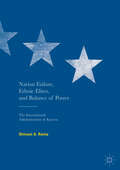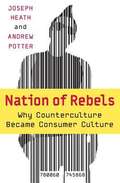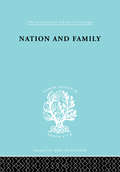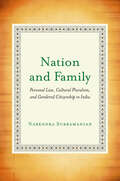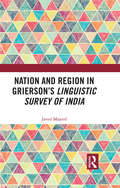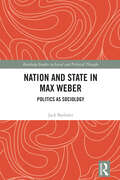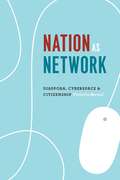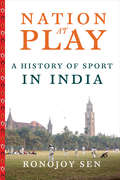- Table View
- List View
Narratives of Immigration in the EU: Migrants in the Romanian and British Press
by Mihaela IorgaThis book examines the representation of migrants and the European Union (EU) in the Romanian and British press, adopting a Critical Discourse Analysis approach to analyse a corpus of newspaper articles published between 1st January 2006 and 31st December 2018. The analysis reveals that through conceptual metaphors, migrants were likened to objects, ships, illegal goods, waves, flows, liquids, invaders, enemies and threats. The key themes identified in the analysis are the quantification and the &‘otherisation&’ of migrants, as well as their portrayal as economic burdens or invaders in their destination countries. With regard to the EU, the author explores how both countries&’ memberships have followed different trajectories than those of other member states, ever since their accession to the EU bloc. The novelty of this research lies in the diachronic comparison of the representations of migrants and the European Union in Romania, a country characterised by emigration, versus the United Kingdom, a country characterised by immigration. This volume will be of interest to academics and students concerned with issues to do with migration and the EU, including those in fields such as political communication, migration policy, sociology of migration, and the language of media.
Narratives of Loss and Longing: Literary Developments in Postcolonial South Asia
by Edited by Nukhbah Taj Langah and Roshni SenguptaThis volume brings together new research on the developing and transforming literary scape in South Asia in the aftermath of the partitions of 1947 and 1971. It thematically explores the transformations that have taken place in the literary spheres of India, Pakistan and Bangladesh, since violence and irresolvable conflicts wreaked the subcontinent, through the narratives of loss and longing.The volume deals with key themes such as feminism, minorities and marginality, vernacular history, Bengali literary representations, and post-Partition artistic and literary representations. It contributes towards fostering a network for academic exchange across the borders thereby presenting diverse and in-depth studies on a plethora of subjects within the larger framework of literary landscapes.Narratives of Loss and Longing will be of interest to scholars of literary studies, postcolonial and decolonial studies, partition studies, minority studies, refugee studies, gender and women's studies and those interested in South Asia, especially India, Pakistan and Bangladesh.
Narratives of Mediterranean Spaces: Literature and Art across Land and Sea (Geocriticism and Spatial Literary Studies)
by Silvia CasertaNarratives of Mediterranean Space: Literature and Art across Land and Sea presents a comparative analysis of contemporary literary and visual narratives of movement and migration produced in Italian, Arabic and French. It analyzes how these works create a dialogue across the Mediterranean Sea. By paying attention to the multiple ways in which the Mediterranean is being narrated by contemporary writers and artists, Silvia Caserta aims to propose a reconceptualization of the Mediterranean as a polyphonic space of movement and resistance. The Mediterranean space that emerges from this study is a space that, by virtue of the instability and porosity of its geographical and cultural borders, is able to overcome normative dichotomies between north and south, east and west, local and global. This book proposes the Mediterranean is a fruitful area from which to investigate the wider contradictions of the contemporary global world while avoiding the traps of “Mediterraneanism”. For this reason, the book highlights the contradictions and dissonances that emerge from reading Mediterranean works, opening up multiple perspectives on the Sea and on the different lands that surround it.
Narratives of Motherhood and Mothering in Fiction and Life Writing (Palgrave Macmillan Studies in Family and Intimate Life)
by Anna Williams Helena Wahlström Henriksson Margaretha FahlgrenThis open access volume offers original essays on how motherhood and mothering are represented in contemporary fiction and life writing across several national contexts. Providing a broad range of perspectives in terms of geopolitical places, thematic concerns, and theoretical and interdisciplinary approaches, it demonstrates the significance of literary narratives for understanding and critiquing motherhood and mothering as social phenomena and subjective experiences. The chapters contextualize motherhood and mothering in terms of their particular national and cultural location and analyze narratives about mothers who are firmly placed in one national context, as well as those who are in “in-between” positions due to migrant experiences. The contributions foreground and link together the themes central to the volume: embodied experience and maternal embodiment; notions of what is “normal” or natural (or not) about motherhood; maternal health and illness; mother-daughter relations; maternality and memory; and the (im)possibilities of giving voice to the mother. They raise questions about how motherhood and mothering are marked by absence and/or presence, as well as by profound ambivalences.
Narratives of Parental Death, Dying and Bereavement: A Kind of Haunting
by Carol Komaromy Caroline PearceThis collection shows what happens when facing the inevitable and sometimes expected death of a parent, and how such an ordinary part of life as parental death might connect with the children left behind. In many ways, individual deaths are extraordinary and leave a unique legacy – a kind of haunting.The authors' accounts seek to make sense of death through witnessing its enactment and recording its detail. All the authors are experienced researchers in the field of death studies, and their collective expertise encompasses ethnography, psychology, sociology and anthropology. The individual descriptions of death and grief capture the everyday practicalities of managing death and dying, including, for example, the difficulties of caring responsibilities and the realities of dealing with strained family relationships. These accounts show the raw detail of death; they are deeply personal observations framed within critical theories. As established scholars and practitioners that have researched and worked in end-of-life and bereavement care, the authors in this anthology offer a unique perspective on how identity is shaped by a close bereavement. The book employs a strong editorial narrative that blends memoir with theoretical engagement, and will be of interest to death studies scholars, as well as practitioners involved in end-of-life care and bereavement care and anyone who has experienced the death of a parent.
Narratives of Place, Belonging and Language: An Intercultural Perspective (Language and Globalization)
by Máiréad Nic CraithExamining identity in relation to globalization and migration, this book uses narratives and memoirs from contemporary authors who have lived 'in-between' two or more languages. It explores the human desire to find one's 'own place' in new cultural contexts, and looks at the role of language in shaping a sense of belonging in society.
Narratives of Sino-Middle Eastern Futures: In the Eye of the Beholder (Elements in Middle East Politics)
by Andrea Ghiselli Mohammed AlsudairiNarratives of Sino-Middle Eastern Futures attempts to discern the future trajectory and endpoint of Sino-Middle Eastern relations – are we on the precipice of a post-American Chinese hegemony in the region? Or are we reaching the outer limits of what is feasible within what are essentially transactional ties? Drawing on a wide range of multilingual sources from 2010 to 2023, and based on a framework of thin constructivism, the Element delves into the Saudi, Syrian and Chinese elite narratives regarding the Middle Eastern regional order and China's envisaged place within it. By centering local perspectives, it offers insights into how these actors –with diverse positionalities in the region (vis-à-vis the United States) and different national capabilities– are debating the future of China in the Middle East, and what the juxtaposition of their multiple narratives mean for where things are headed. This title is also available as Open Access on Cambridge Core.
Narratives of Social Justice Educators
by Shirley Mthethwa-SommersThis book presents narratives of eminent social justice educators, which provide a window into why these educators have made it their mission to educate for attainment of social justice; it succinctly defines what social justice education is and what it is not. Eleven nationally and internationally eminent narratives of social justice educators, namely, Beverly Daniel Tatum, Sonia Nieto, Kevin Kumashiro, Valerie Ooka Pang, Teresita Aguilar, Gaille Canella, Christine Sleeter, Julie Andrzejewski, Norma Bailey, Kent Koppelman, and Cathy Pohan, are featured. Racial, gender, socio-economic class, and sexuality diversity of the social justice educators enriches the book by providing multidimensional perspectives on the impact of social positioning in choosing to educate for social justice. Chapter One, "Introduction to Social Justice Educators," provides an in-depth introduction to the social justice educators who are featured in the book. It delineates reasons they were selected to participate in the study of narratives for social justice educators. This chapter highlights diverse paths that contributed to the participants engaging in social justice education and outlines all their contributions to social justice education. Chapter Two, "Personal Influence," describes the participants' personal influences and how formative years of interacting with family members and peers contributed in shaping their identities as social justice educators. In addition, this chapter examines how their varied racial, gender, and sexuality identities served to prepare them for their profession. Chapter Three, "Professional Influence," offers a window into the participants' professional life influences on their choice to work toward social justice education. The educators discuss the impact of individual teachers and professors, the field in which they work and exposure to specific curriculum and readings that served to ignite their interest in educating for social justice. Chapter Four, " Impact of Social and Historical Events," explores the influence of social and historical events had in the evolution of social justice educators. Such events compelled social justice educators to critically reflect on their roles in society and the importance of engaging in social justice activism through their work. Chapter Five, " Reasons for Standing Firm," focuses on reasons that keep social justice educators holding firm to their convictions of social justice education and teaching for social change. It explores the role of spirituality and their sense of commitment. Chapter Six , "Epilogue," offers a synthesis of the experiences of social justice educators, implications for teacher education programs, and lessons that can be gleaned from their narratives. Stories from the social justice educators provide theoretical and pedagogical frameworks for teaching about social justice issues in education. Each chapter concludes with lessons that can be gleaned from the narratives and applied when working with students.
Narratives of Trauma and Moral Agency among Christian Post-9/11 Veterans
by Thomas Howard Suitt, IIIServing in the military is often a disruptive event in the lives of those who join, precipitating a reassessment of the service member’s ethical sensibilities or, tragically, resulting in lasting moral injury and trauma. The military experience compels them to navigate multiple identities, from citizen to warrior and back. Their religious identity, sometimes rooted in a civilian religious community, can be altered by military participation. Through a series of inductive, in-depth qualitative interviews, Suitt explores how varied religious resources and potentially traumatic events affect the lives of post-9/11 veterans who once or currently identified as Christian. Adding to existing research on moral injury, it traces how military chaplains, ethics education, just war theory rhetoric, and formal religious practice supplied by the military alter the course of service members’ moral lives. These narrative trajectories reveal how veterans use Christian faith or other systems of meaning-making to understand war and their identities as service members and veterans.
Narratives of Unsettlement: Being Out-of-joint as a Generative Human Condition (Routledge Advances in Feminist Studies and Intersectionality)
by Madina TlostanovaThis book uses an interdisciplinary inter-mediational approach to reflect on the relational complexity of unsettlement as a predominant sensibility of the present époque. The book tackles interrelated aspects of unsettlement including temporality, the disconcerting effects of the Anthropocene, the biomedical facets of unsettlement, and the post-pandemic futures. It uses a chimeric approach combining essayistic and speculative fiction writing methods, negotiating rational, affective and imaginative ways of inquiry, and showing rather than merely explaining. The book poses questions, but gives no ready-made answers, and invites us to think together on the unsettlement as a negatively global human condition that can be collectively made into a generative move of resurgence and refuturing. Contributing to critical reflections on the main features and sensibilities of the current époque, the book will be of interest to scholars and undergraduate and graduate students, as well as the general public, interested in critical global and future perspectives, in decolonial research, gender studies, and posthumanities.
Narratives of Wellbeing
by John Taylor Timothy Willem Jones Tarryn Phillips Natalie AraújoThis book critically interrogates ‘wellbeing’, a concept that is exploding in popularity across the globe. The collection of essays asks not only how wellbeing can be defined and measured, but what is created and excluded in the process of striving for and articulating wellbeing. The editors propose a narrative framework as a novel and insightful lens through which to analyse wellbeing and understand how the “good life” is sought, experienced and talked about. With case studies from around the world, the contributions explore the tensions and overlaps between various scripts about what it means to live well—historically, socially, culturally, economically, and spiritually. The collection brings together a rich array of disciplinary perspectives, including: sociology, politics, anthropology, history, indigenous studies, religious studies, development studies, paediatric medicine, and gender and sexuality studies. The diversity of chapters make the book accessible and appealing, not only to scholars and students of wellbeing in the health and social science disciplines, but also to a broader public readership intrigued by the rise and impact of a buzzword.
Narratives of Women’s Health and Hysteria in the Nineteenth-Century Novel (Palgrave Studies in Literature, Science and Medicine)
by Melissa RampelliNarratives of Women’s Health and Hysteria in the Nineteenth-Century Novel looks extensively at hysteria discourse through medical and sociological texts and examines how this body of work intersects with important cultural debates to define women’s social, physical, and mental health. The book sketches out prominent shifts in cultural reactions to the idea of diffused agency and the prized model of the interiorized, individual person capable of self will and governance. Melissa Rampelli takes up the work of Jane Austen, Charles Dickens, George Eliot, and Thomas Hardy, showing how the authors play with and manipulate stock literary figures to contribute to this dialogue about the causes and cures of women’s hysterical distress.
Narratives, Politics, and the Public Sphere: Struggles Over Political Reform in the Final Transitional Years in Hong Kong (1992–1994) (Routledge Revivals)
by Agnes S.M. KuPublished in 1999, the book invites readers to rethink about the contemporary form of politics in terms of the cultural and narrative logics of public discourse. The author proposes that the notions of 'public' and 'narrative' are central to understanding the discursive formation of public opinion. Incorporating a reformulated conception of the public into a theory of narrative progression, Dr. Ku explains (1) the interaction between narrative construction and political conflicts in politics of public credibility and (2) the progressive or narrative formation of the force of the ’public’ out of the struggle as well as its power over the positioning and re-positioning of the actors. Using the method of textual interpretation of newspaper discourses, she analyzes the interplay between politics and the 'public' by delving into the continuously changing narrative contexts wherein the controversy over governor Patten’s reform proposals unfolded in Hong Kong between 1992 and 1994.
Narrowing the Achievement Gap: Parental Engagement with Children’s Learning (Routledge Research in Education)
by Janet GoodallNarrowing the Achievement Gap proposes a radical change to our conception of learning, education and schooling, arguing that parental engagement is the best lever we have for school improvement and closing the achievement gap. Unique in its focus on original research linking underachievement and parental engagement, this book uses a range of international case studies to demonstrate that achievement isn’t only reliant on what happens in school and that what happens out of school is equally important. Each chapter explores how schools can actively engage with parents and communities to reinstate education in the home, and to generate support to combat issues out of their control, including poverty, deprivation, and a lack of social capital. Although schools have an integral part to play in this process, it argues that parents and society must reconsider their own educational responsibility, regardless of background, and offers a solid research base and practical suggestions to help do so. Consisting of an in-depth and contemporary study of this significant issue in educational achievement and written by an expert in the field, this text will appeal to researchers, academics and postgraduate students in the fields of education, schooling, sociology of education, school effectiveness and improvement, school policy and school leadership.
Nasty Women: Feminism, Resistance, and Revolution in Trump’s America
by Kate Harding Samhita MukhopadhyayTwenty-Three Leading Feminist Writers on Protest and Solidarity. When 53 percent of white women voted for Donald Trump and 94 percent of black women voted for Hillary Clinton, how can women unite in Trump's America? Nasty Women includes inspiring essays from a diverse group of talented women writers who seek to provide a broad look at how we got here and what we need to do to move forward. Featuring essays byREBECCA SOLNIT on Trump and his "misogyny army,"CHERYL STRAYED on grappling with the aftermath of Hillary Clinton's loss,SARAH HEPOLA on resisting the urge to drink after the election,NICOLE CHUNG on family and friends who support Trump,KATHA POLLITT on the state of reproductive rights and what we do next,JILL FILIPOVIC on Trump's policies and the life of a young woman in West Africa,SAMANTHA IRBYon racism and living as a queer black woman in rural America,RANDA JARRAR on traveling across the country as a queer Muslim American,SARAH HOLLENBECK on Trump's cruelty toward the disabled,MEREDITH TALUSAN on feminism and the transgender community, andSARAH JAFFE on the labor movement and active and effective resistance,among others.
Nation Building: Why Some Countries Come Together While Others Fall Apart (Princeton Studies in Global and Comparative Sociology)
by Andreas WimmerA new and comprehensive look at the reasons behind successful or failed nation buildingNation Building presents bold new answers to an age-old question. Why is national integration achieved in some diverse countries, while others are destabilized by political inequality between ethnic groups, contentious politics, or even separatism and ethnic war? Traversing centuries and continents from early nineteenth-century Europe and Asia to Africa from the turn of the twenty-first century to today, Andreas Wimmer delves into the slow-moving forces that encourage political alliances to stretch across ethnic divides and build national unity.Using datasets that cover the entire world and three pairs of case studies, Wimmer’s theory of nation building focuses on slow-moving, generational processes: the spread of civil society organizations, linguistic assimilation, and the states’ capacity to provide public goods. Wimmer contrasts Switzerland and Belgium to demonstrate how the early development of voluntary organizations enhanced nation building; he examines Botswana and Somalia to illustrate how providing public goods can bring diverse political constituencies together; and he shows that the differences between China and Russia indicate how a shared linguistic space may help build political alliances across ethnic boundaries.Wimmer then reveals, based on the statistical analysis of large-scale datasets, that these mechanisms are at work around the world and explain nation building better than competing arguments such as democratic governance or colonial legacies. He also shows that when political alliances crosscut ethnic divides and when most ethnic communities are represented at the highest levels of government, the general populace will identify with the nation and its symbols, further deepening national political integration.Offering a long-term historical perspective and global outlook, Nation Building sheds important new light on the challenges of political integration in diverse countries.
Nation Failure, Ethnic Elites, and Balance of Power: The International Administration of Kosova
by Shinasi A. RamaThis book examines the history of nation-building in Kosova as a model of how the theories behind nation-building, state-building and peace-building can succeed or fail. The author argues that two missing factors led to successful state-building but failed nation-building in Kosova: the balance of power and the ethnic elite. The author uses his unique expert knowledge gained over thirty years of study to present a thorough overview of international administration and nation-building in Kosova.
Nation Of Rebels: Why Counterculture Became Consumer Culture
by Joseph Heath Andrew PotterIn this wide-ranging and perceptive work of cultural criticism, Joseph Heath and Andrew Potter shatter the most important myth that dominates much of radical political, economic, and cultural thinking. The idea of a counterculture -- a world outside of the consumer-dominated world that encompasses us -- pervades everything from the antiglobalization movement to feminism and environmentalism. And the idea that mocking or simply hoping the "system" will collapse, the authors argue, is not only counterproductive but has helped to create the very consumer society radicals oppose. In a lively blend of pop culture, history, and philosophical analysis, Heath and Potter offer a startlingly clear picture of what a concern for social justice might look like without the confusion of the counterculture obsession with being different.
Nation and Family (International Library of Sociology)
by Alva MyrdalThis is Volume XIV out of fifteen on a series of the Sociology of Gender and the Family. Originally published in 1945, this study shows the Swedish Experiment in democratic family and population policy.
Nation and Family: Personal Law, Cultural Pluralism, and Gendered Citizenship in India
by Narendra SubramanianThe distinct personal laws that govern the major religious groups are a major aspect of Indian multiculturalism and secularism, and support specific gendered rights in family life. Nation and Family is the most comprehensive study to date of the public discourses, processes of social mobilization, legislation and case law that formed India's three major personal law systems, which govern Hindus, Muslims, and Christians. It for the first time systematically compares Indian experiences to those in a wide range of other countries that inherited personal laws specific to religious group, sect, or ethnic group. The book shows why India's postcolonial policy-makers changed the personal laws they inherited less than the rulers of Turkey and Tunisia, but far more than those of Algeria, Syria and Lebanon, and increased women's rights for the most part, contrary to the trend in Pakistan, Iran, Sudan and Nigeria since the 1970s. Subramanian demonstrates that discourses of community and features of state-society relations shape the course of personal law. Ruling elites' discourses about the nation, its cultural groups and its traditions interact with the state-society relations that regimes inherit and the projects of regimes to change their relations with society. These interactions influence the pattern of multiculturalism, the place of religion in public policy and public life, and the forms of regulation of family life. The book shows how the greater engagement of political elites with initiatives among the Hindu majority and the predominant place they gave Hindu motifs in discourses about the nation shaped Indian multiculturalism and secularism, contrary to current understandings. In exploring the significant role of communitarian discourses in shaping state-society relations and public policy, it takes "state-in-society" approaches to comparative politics, political sociology, and legal studies in new directions.
Nation and Family: Personal Law, Cultural Pluralism, and Gendered Citizenship in India
by Narendra SubramanianThe distinct personal laws that govern the major religious groups are a major aspect of Indian multiculturalism and secularism, and support specific gendered rights in family life. Nation and Family is the most comprehensive study to date of the public discourses, processes of social mobilization, legislation and case law that formed India's three major personal law systems, which govern Hindus, Muslims, and Christians. It for the first time systematically compares Indian experiences to those in a wide range of other countries that inherited personal laws specific to religious group, sect, or ethnic group. The book shows why India's postcolonial policy-makers changed the personal laws they inherited less than the rulers of Turkey and Tunisia, but far more than those of Algeria, Syria and Lebanon, and increased women's rights for the most part, contrary to the trend in Pakistan, Iran, Sudan and Nigeria since the 1970s. Subramanian demonstrates that discourses of community and features of state-society relations shape the course of personal law. Ruling elites' discourses about the nation, its cultural groups and its traditions interact with the state-society relations that regimes inherit and the projects of regimes to change their relations with society. These interactions influence the pattern of multiculturalism, the place of religion in public policy and public life, and the forms of regulation of family life. The book shows how the greater engagement of political elites with initiatives among the Hindu majority and the predominant place they gave Hindu motifs in discourses about the nation shaped Indian multiculturalism and secularism, contrary to current understandings. In exploring the significant role of communitarian discourses in shaping state-society relations and public policy, it takes "state-in-society" approaches to comparative politics, political sociology, and legal studies in new directions.
Nation and Region in Grierson’s Linguistic Survey of India
by Javed MajeedGeorge Abraham Grierson’s Linguistic Survey of India is one of the most complete sources on South Asian languages. This book is the first detailed examination of the Survey. It shows how the Survey collaborated with Indian activists to consolidate the regional languages in India. By focusing on India as a linguistic region, it was at odds with the colonial state’s conceptualisation of the subcontinent, in which religious and caste differences were key to its understanding of Indian society. A number of the Survey’s narratives are detachable from its rigorous linguistic imperatives, and together with aspects of Grierson’s other texts, these contributed to the way in which Indian nationalists appropriated and reshaped languages, making them religiously charged ideological symbols of particular versions of the subcontinent. Thus, the Survey played an important role in the emergence of religious nationalism and language conflict in the subcontinent in the 20th century. This volume, like its companion volume Colonialism and Knowledge in Grierson’s Linguistic Survey of India, will be a great resource for scholars and researchers of linguistics, language and literature, history, political studies, cultural studies and South Asian studies.
Nation and State in Max Weber: Politics as Sociology (Routledge Studies in Social and Political Thought)
by Jack BarbaletThis book shows how Max Weber’s perceptions of the social and political world he inhabited in Wilhelmine Germany were characterized by a nationalist commitment which coloured practically every aspect of his thought, including his social scientific writings and the formulations they expound. Exploring the consequences of Weber’s ardent nationalism in a manner seldom acknowledged in existing scholarship, it considers the alignment of his commitment to liberalism and democracy with his devotion to the ideal of the German people as an ethno-racial community supported by a power-state, with the purpose of realizing the national interest of future generations of Germans. Through an analysis of a range of texts, the author contends that Weber’s liberalism is not based on universalistic principles and that Weber considered the liberty he espoused to play an important role in securing the position of a political elite trained in parliamentary institutions, which are used to shape the citizenry in the pursuit of a patriotic commitment to an expansionist, imperial state. It will therefore appeal to scholars with interests in the history of sociology and classical social theory.
Nation as Network: Diaspora, Cyberspace, and Citizenship
by Victoria BernalHow is the internet transforming the relationships between citizens and states? What happens to politics when international migration is coupled with digital media, making it easy for people to be politically active in a nation from outside its borders? In Nation as Network, Victoria Bernal creatively combines media studies, ethnography, and African studies to explore this new political paradigm through a striking analysis of how Eritreans in diaspora have used the internet to shape the course of Eritrean history. Bernal argues that Benedict Anderson’s famous concept of nations as “imagined communities” must now be rethought because diasporas and information technologies have transformed the ways nations are sustained and challenged. She traces the development of Eritrean diaspora websites over two turbulent decades that saw the Eritrean state grow ever more tyrannical. Through Eritreans’ own words in posts and debates, she reveals how new subjectivities are formed and political action is galvanized online. She suggests that “infopolitics”—struggles over the management of information—make politics in the 21st century distinct, and she analyzes the innovative ways Eritreans deploy the internet to support and subvert state power. Nation as Network is a unique and compelling work that advances our understanding of the political significance of digital media.
Nation at Play: A History of Sport in India (Contemporary Asia in the World)
by Ronojoy SenReaching as far back as ancient times, Ronojoy Sen pairs a novel history of India's engagement with sport and a probing analysis of its cultural and political development under monarchy and colonialism, and as an independent nation. Some sports that originated in India have fallen out of favor, while others, such as cricket, have been adopted and made wholly India's own. Sen's innovative project casts sport less as a natural expression of human competition than as an instructive practice reflecting a unique play with power, morality, aesthetics, identity, and money.Sen follows the transformation of sport from an elite, kingly pastime to a national obsession tied to colonialism, nationalism, and free market liberalization. He pays special attention to two modern phenomena: the dominance of cricket in the Indian consciousness and the chronic failure of a billion-strong nation to compete successfully in international sporting competitions, such as the Olympics. Innovatively incorporating examples from popular media and other unconventional sources, Sen not only captures the political nature of sport in India but also reveals the patterns of patronage, clientage, and institutionalization that have bound this diverse nation together for centuries.
